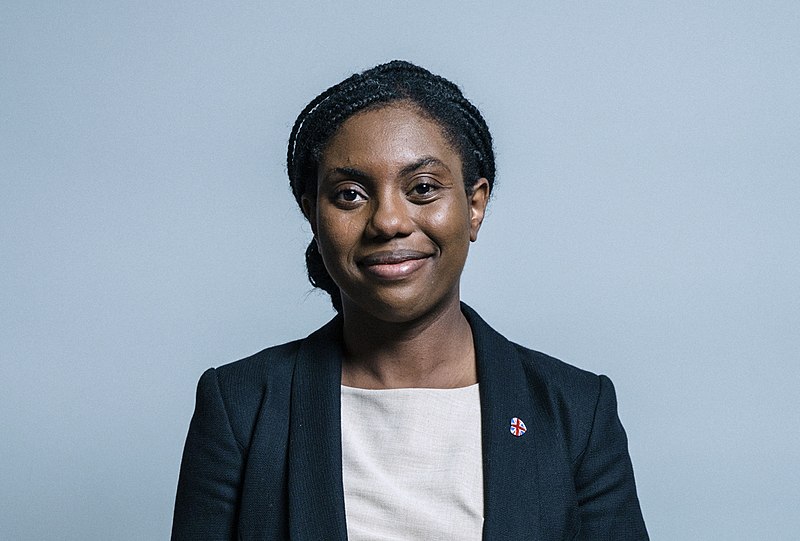
Following the elimination of former Interior Minister Priti Patel from the Conservative leadership race, five contenders remain in the running to shape the future of Britain’s
once-dominant Conservative Party. The leadership contest will culminate on November 2, when party members cast their final votes to choose a successor to former Prime Minister Rishi Sunak. The new leader will face the monumental task of revitalizing a party that was severely defeated by Labour in the July election.
Here are the remaining candidates and their key policies:
Kemi Badenoch
Kemi Badenoch, 44, a former trade minister, has emerged as a bold and outspoken figure, particularly admired by the right-wing faction of the party and younger Conservative members. Badenoch promises a fresh perspective, often challenging the government system she describes as "broken."
Her campaign centers on principles such as personal responsibility, equality under the law, citizenship, family values, and truth. Badenoch's commitment to a more traditionalist conservative approach has been divisive; while some praise her directness on issues like Brexit and "identity politics," others find her views controversial. Drawing on her upbringing in Nigeria, Badenoch has pledged to “rebuild the party, rewire the state, reboot the economy, and revive the country."
"It's time for something different," she declared at her campaign launch. "The British people are yearning for something better—and this Labour government is not it."
Robert Jenrick
At 42, Robert Jenrick gained attention by resigning as immigration minister under Sunak due to his opposition to the "fatally flawed" Rwanda plan for handling asylum seekers. He criticized the plan for not being tough enough, marking his shift from a centrist to a more right-leaning figure in the party.
Jenrick advocates setting a strict cap on legal migration in the tens of thousands and proposes swiftly deporting illegal migrants to a third country, such as Rwanda, within days of arrival. He also supports Britain’s departure from the European Convention of Human Rights to strengthen immigration controls.
“The public is demanding action,” he said recently, stressing that the Conservative Party would have to deliver meaningful changes if it hoped to regain the public’s trust.
Tom Tugendhat
Former soldier Tom Tugendhat, 51, is positioning himself as a reliable and pragmatic leader, emphasizing his loyalty and relatively untainted record amid the scandals that have plagued the Conservative Party. Tugendhat has framed his campaign as “sober” and committed to restoring trust.
A moderate within the party, he has highlighted his key priorities: strengthening the unity of the United Kingdom, improving foreign policy, managing migration, and reforming public services. Tugendhat also plans to increase defense spending to 3% of GDP and introduce clear immigration targets, aiming for a maximum net migration of 100,000 people per year.
“This is no time for a novice,” he said, positioning himself as a leader with the experience and maturity to steer the party.
James Cleverly
James Cleverly, 55, has built a reputation as one of the Conservative Party’s best communicators, a leader who can bridge the gap between the party’s right-wing and more moderate factions. A former interior and foreign minister, Cleverly has used his record on immigration to strengthen his candidacy, advocating for the revival of the controversial plan to send asylum seekers to Rwanda.
In a world Cleverly describes as increasingly unstable, he also pledged to boost defense spending to 3% of GDP, emphasizing the need for a strong and stable government. He told his supporters, "I am uniquely suited to unite the party, win at the next general election, and deliver for the British people once again."
Mel Stride
Mel Stride, 62, a moderate and close ally of Rishi Sunak, has emerged as a dark horse in the leadership contest. Despite low initial expectations, Stride survived the first round of voting and is now positioning himself as the unifier the party needs.
Stride has vowed to bring together the "whole conservative family" and reclaim voters who defected to right-wing parties like Reform UK, as well as those who turned to Labour or the Liberal Democrats. Acknowledging the party’s recent struggles, Stride has said the Conservatives have "lost the trust of the British people and our reputation for competence." His plan focuses on reforming the party’s organization, decentralizing its structure, and making it more responsive to local needs.
The Road Ahead
As the race continues, each candidate faces the challenge of reviving a party grappling with internal divisions and an electorate that has shifted significantly since the July defeat. Whoever wins will be tasked with uniting the Conservative Party and rebuilding its appeal ahead of the next general election. Photo by Chris McAndrew, Wikimedia commons.


































